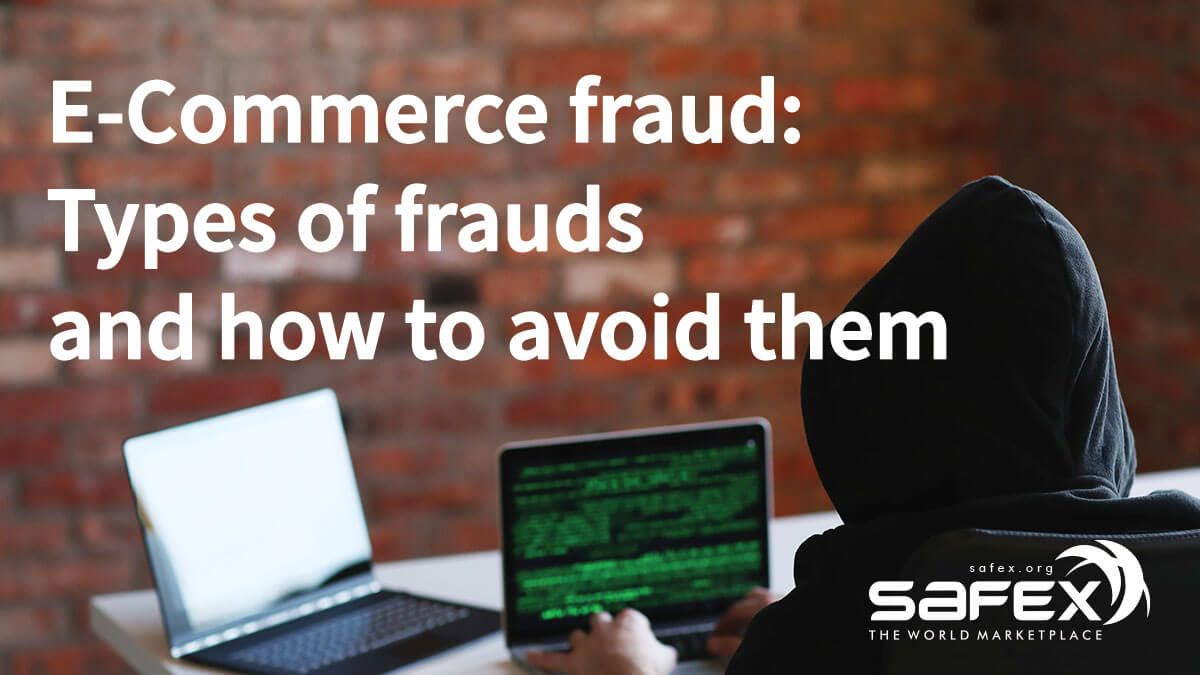E-Commerce fraud: Types of frauds and how to avoid them
E-Commerce fraud is one of the major issues that can affect any E-Commerce business and decrease their profits. This article will provide information about different types of E-Commerce frauds on traditional platforms and how to avoid them - also by using a new blockchain-based E-Commerce platform.

Running an eCommerce business can be one of the most lucrative businesses of today. Nevertheless, although it is easily scalable it is also very vulnerable, so your eCommerce revenue and profit may often be affected by numerous unpredictable factors such as fraudulent activity by malicious actors.
According to a report published by Global Payment Fraud Statistics, Trends & Forecasts, losses due to payment fraud have more than tripled from $9.84 billion in 2011 to $32.39 billion in 2020. Moreover, these figures and trends are projected to increase another 25%, which would amount to a total of $40.62 billion, by 2027.
In order to successfully fight against this devastating data and overcome those undesirable practices, we decided to provide you with the most common fraud practice types and possible ways of dealing with them effectively.
1. Credit card fraud
One of the most commonly performed eCommerce frauds is associated with credit cards, and they come in various forms.
For example, an individual might try to finish a purchase using a stolen credit card - meaning a specific product has been bought while misusing someone else's identity. The problem is getting even more complex when it comes to reimbursement since an eCommerce store owner is obliged to give back money to the legitimate card owner. This equals to a double loss for the affected business.
What can you do to protect yourself and your customers?
Requiring security codes every time a purchase is about to be made is one of the most effective techniques for preventing credit card fraud. So, before accepting the payment, your customer should be required to input the security code. This is usually enough to cut the fraud process in this case.
2. Credit card testing
Credit card testing implies using a stolen credit card when fraudsters try to check if the credit card information is valid. The fraudsters' idea is to try finishing a purchase on an eCommerce store, and if the credit card is accepted, it means they could continue doing fraudulent activity. Credit card testing is also performed when fraudsters want to find out the reason why a credit card payment is denied. After gathering a series of responses from different eCommerce websites, they are usually ready to overcome this problem and misuse the credit card.
3. Chargeback fraud
Chargeback fraud is one of the most problematic issues for eCommerce stores, which might cause up to 2% in revenue loss if it is not prevented in due time. Not only that the business loses its product and money from the sale, it is also obliged to pay the chargeback fees to the bank, which can exceed $100 per transaction.
Chargeback fraud happens every time a fraudulent customer makes a purchase and receives the product, after which he calls back his bank and reports credit card theft demanding the reimbursement of expenses.
However, there is a way you can fight these fraudulent attempts. One possible solution is to track the credit card number and contact the associated bank to verify if the credit card really has been stolen. Another possible solution is checking their addresses. If the shipping address differs from the address noted on the used card, this is a well-founded reason for becoming suspicious and taking legal actions.
Since chargeback frauds are such a common practice, you should also think about hiring a professional who has got experience in this matter and knows how to fight it or try to find a software solution that prevents it.
4. Phishing
In case of phishing, scammers usually try to get someone else's personal data, such as credit card details, passwords, or IDs, so they can misuse it later. For example, one of the most common phishing practices is sending fraudulent emails that often misuse some reputable company name, institution or even bank and asking for sensible information. In some cases, they could even contact you through the phone and pretend to be from a credit institution, saying they need to confirm data about a client since there is a change in their system.
Due to their refined techniques, it is often very hard to determine whether a fraud is taking place. However, before answering an email or question through the phone, try to check with the real company if these are really pieces of information they could legitimately ask for, or you both are a victim of fraudsters. The moment you confirm this is a classic fraud attempt, don't forget to take legal actions with Federal Trade Commission or similar institutions in your country and report a phishing attack.
How to deal with E-Commerce frauds
1. Software for fraud detection
Multiple software solutions provide their users with automated processes that can detect potential fraud. The use of such software is a good solution for companies of all sizes, but as a specialized third-party service it is especially valuable for small companies that don't have time, the funds or human resources to develop their own solution. Although these solutions may be quite pricey, they guarantee a positive return on investment. So, if it fits in your budget and doesn't present an additional financial burden, then implementing such a solution in your workflows will definitely be useful.
2. PCI compliance
The Payment Card Industry Data Security Standard (PCI DDS) is a set of requirements that prescribes how companies should store and process information associated with a credit card and cardholder information. PCI compliance is dedicated to attaining a secure online environment, especially when it comes to online payment transactions. Since PCI compliance is mandatory, failure to follow the regulations may lead to paying penalties or getting sanctioned. Thus, creating a firewall between the web store's system and any system storing credit card numbers is non-negotiable for any eCommerce business.
3. Blacklists
Creating blacklists of customers who attempted to perform fraud across your website can be a useful source for defending yourself once they try it again. Whether you create those blacklists by yourself or using software, the point is the same - you will simply ban them from your website and disable them from shopping in your eCommerce store.
However, any of the listed options is not a permanent solution and none of them can guarantee complete protection. All of them are just examples of useful practices that may decrease the number of successful fraud attempts. Hence, if you want a stable, affordable and permanent solution, then using a blockchain-based eCommerce platform, such as Safex Marketplace powered by Safex, can be what you are looking for.
How to fight against E-Commerce frauds using blockchain technology
There are various effective software solutions for fighting against eCommerce fraud on the traditional platforms. However, if you want to avoid any fraudulent attempts permanently, you should consider the usage of blockchain-based eCommerce platforms. A trustworthy and reputable one is Safex Marketplace, where the evolution of eCommerce is already happening.
The advanced features of blockchain technology guarantee protection of personal and financial data due to encryption methods. As a result, any fraud attempt similar to chargeback fraud, phishing, or credit cards is impossible to perform. Since The World Marketplace is a blockchain-based eCommerce platform, it provides its users with an alternative payment method being cryptocurrency which does not require any assistance from or connection to banks and the use of credit cards. This means that you won't be required to provide the merchant with any personal or financial data besides data needed for shipping. In this case, online shopping with cryptocurrency can be done using ring signatures, enabling full privacy for both merchants and buyers. The feature of immutable transactions once they are settled eliminates the chargeback fraud risk on the merchant's side.
